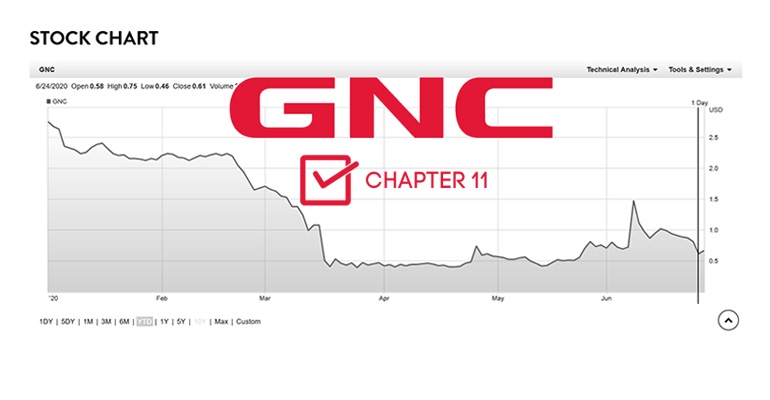Auction canceled: GNC's largest stockholder submits only bid
Committee of unsecured creditors objects, accuses GNC and Harbin of secret negotiations, rigged process to ensure the Chinese company would be the buyer.

Tuesday's auction of GNC's assets has been canceled, as only one company—Harbin Pharmaceutical—submitted a bid by Friday's deadline.
Harbin Pharmaceutical was GNC Holdings Inc.'s largest shareholder before the health and wellness company filed bankruptcy in June and was delisted from the New York Stock Exchange. Harbin agreed in August to be the Stalking Horse Bidder, which granted the Chinese company certain protections in bidding and set the floor price for other bids.
However, a group of unsecured creditors last week filed a lengthy objection to the sale, accusing GNC and Harbin of negotiating secretly and rigging the process so that Harbin would be the only bidder.
When U.S. Bankruptcy Court Judge Karen Owens approved the Stalking Horse Agreement between GNC and Harbin in August, she found that the two companies "negotiated the Stalking Horse Agreement at arm's length and in good faith, without collusion." She will hear the unsecured creditors' objection—as well as other objections from landlords, vendors and contractors—during a court hearing Thursday.
At the same hearing, she will decide whether to approve the sale of GNC's assets.
Harbin's bid was more than $750 million for nearly all of GNC's assets, GNC reported to the Securities and Exchange Commission on Monday. The company invested about $300 million in 2018 and 2019 when Harbin and GNC formed a joint partnership so Harbin could sell GNC-branded products in China.
Harbin Pharmaceutical was GNC Holdings Inc.'s largest shareholder before the health and wellness company filed bankruptcy in June and was delisted from the New York Stock Exchange. Harbin agreed in August to be the Stalking Horse Bidder, which granted the Chinese company certain protections in bidding and set the floor price for other bids.
In response to a request for an interview with GNC CEO Ken Martindale or Chief Financial Officer Tricia Tolivar, a company spokeswoman replied via email:
"Harbin is a long-time and trusted partner of GNC, and we are excited to move forward with them in this process as we seek the Court’s approval of the transaction. We are pleased with the confidence our lenders and business partners have shown in the future of GNC throughout this process and are confident we will emerge a stronger business to the benefit of our associates, consumers, franchise partners and other stakeholders."
Company officials would not comment on the unsecured creditors' objection, the spokeswoman said.
GNC last week entered to the court a list of contracts and leases that Harbin Pharmaceutical would assume. The list included 3,540 franchise agreements, included 785 in the United States. It wasn't immediately clear how many stores those agreements covered.
Nearly 1,000 U.S. stores are closing, according to a GNC website that was updated Sept. 1.
GNC Holdings Inc. filed for Chapter 11 Bankruptcy Court protection on June 23, a week before it would have had to pay $895 million to lenders.
Three months earlier, GNC informed the Securities and Exchange Commission that it did not expect to have the cash to pay its debts.
The coronavirus pandemic wrecked any chance GNC had to avoid filing for bankruptcy court protection. At the end of March, 25% of the company's stores in the U.S. and Canada were temporarily closed and another 20% were operating with limited hours, Martindale said during a March earnings call.
At the end of the first quarter, GNC's prospects were even worse: 30% of company-owned and franchise stores in the U.S. and Canada were closed, Martindale said, and that grew to 40% by the end of April.
About the Author(s)
You May Also Like




